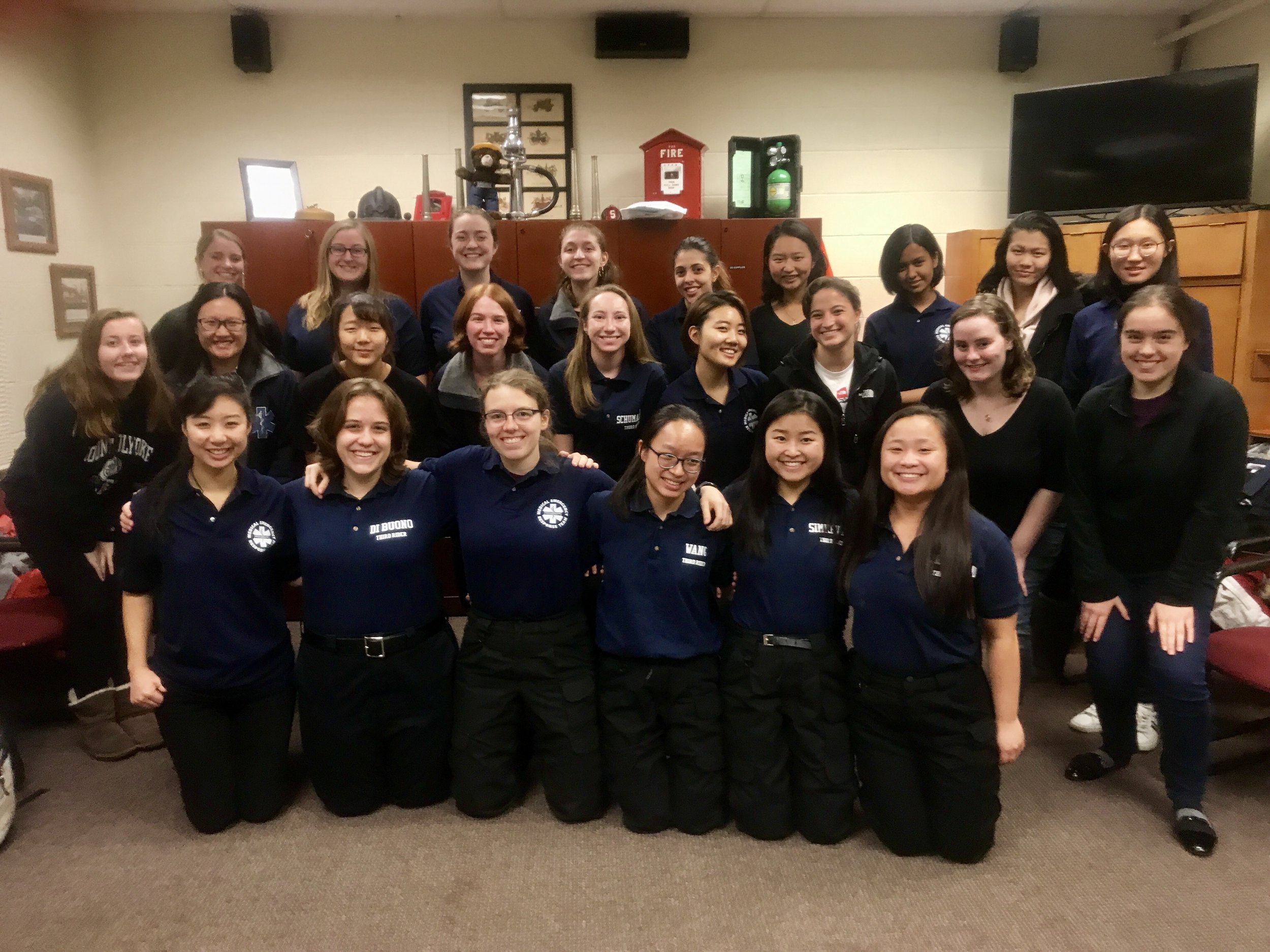Photo by Emily Pollack ’20
Members of Mount Holyoke’s MERT (pictured above) do not recieve payment or academic credit for their work.
BY MERYL PHAIR ’21
“If someone is dying, you’re not going to be telling them molecular equations,” said Maddy Berkowitz-Cerasano ’18, director of the Medical Emergency Response Team (MERT). MERT is a student-run organization consisting of 24 first responders and six certified EMTs. For many volunteers, MERT offers real world experiences, unlike the textbook equations they learn in class.
MERT members Berkowitz-Cerasano, Louise Tanner ’19 and Helen Wang ’18 said they enjoy the commitment, but face a major challenge: despite long hours of certification training and volunteer service on campus, members of MERT don’t receive academic credit or payment for their work. For years, students have been trying to get the College to offer the same academic and financial support other schools provide their students in order to make this experience more accessible.
Students working as first responders and EMTs directly benefit the campus community. “Students feel more comfortable calling in for help if they know their peers will be the ones responding,” said Tanner. According to Tanner, this means fewer calls to the fire department for situations that certified students can handle themselves. Three EMT members also work with the athletic trainers each semester providing medical assistance to athletes during home games.
In the past, MERT members were on-call Sunday through Thursday from 6 p.m. to 12 a.m., as well as Friday and Saturday from 7 p.m. to 3 a.m. According to Ioanna Deni '19, the MERT senator, the squad no longer works weeknight shifts due to a lack of personnel.
In order to be considered a first responder, students have to take a CPR and first-aid class. All members of MERT are required to complete 32 hours of shifts each semester and attend all meetings, which are held at the South Hadley District II Fire Department on Sunday evenings at 8 p.m.
Greenfield Community College runs EMT certification courses at Mount Holyoke College. The cost of the course is $1000, plus an additional $80 for the final exam; the cost of books is approximately $280. At Greenfield Community College, this class is worth eight credits. Mount Holyoke College does not offer credit for this course or help to reduce the cost for students.
Every two years, both EMTs and CPR first responders are required to take an additional re-certification course.
Tanner said encouraging certification is difficult for MERT because not all students can make the financial or time commitment even if they would be perfect for the job. Because there are so few members in MERT — especially certified EMTs students — members must take on more shifts.
Despite being a student organization, MERT has been repeatedly denied funding from the Student Government Association (SGA) for EMT courses. According to SGA, the funding would benefit an individual and not the community or squad. SGA Vice President Val Montesino ’19 was also last year’s chair of the Ways and Means Committee which oversees the funding designated for the recognized student organizations. “The only pot of money SGA has access to goes to fund events and off-campus learning experiences for orgs,” Montesino said. The EMT course is an on-campus learning experience.
Another reason the College won’t give credit for the EMT course is that the course is considered to be pre-professional and Mount Holyoke is a liberal arts school.
Other schools in the Five College Consortium offer financial assistance to student EMTs. At Amherst College, the school covers the cost of the annual EMT certification class. At Hampshire College, academic credit is available for the campus EMT positions, as well as scholarships for the EMT course.
Health Center Director Karen Engell, who works with MERT, reached out to Gary Gillis, professor of biological sciences and associate dean of faculty, about the issue. “Credit-bearing course proposals are vetted through the College’s Academic Priorities Committee (APC), and may be submitted by any ‘academic entity’ for approval,” said Gillis. MERT has been unable to get approved for an academic faculty advisor, said Berkowitz-Cerasano, so they have not been able to submit any such proposal.
MERT has also tried other routes to earn academic credit, including attempts to connect with the Community Based Learning program, and getting participation in MERT to count as an independent study. Both these approaches have been unsuccessful. Regarding payment for their work, Berkowitz-Cerasano said “there isn’t any benefit for the college” to pay students for their time.
The issue has been brought to Marcella Runell Hall, vice president for Student Life and dean of students, who said “My plan is to bring this forward with the APC to get more clarity on what the options are.”

